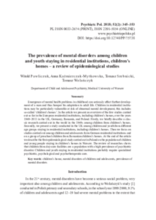Displaying 281 - 290 of 744
The Bucharest Early Intervention Project sought to examine the effects of foster care as an alternative to institutional care for abandoned infants in Romanian institutions.
In the current study the authors examined associations between children's pre-adoption experiences (type of pre-adoption care and early deprivation) and their adaptive and maladaptive behavioral adjustment.
This paper discusses findings from a small-scale qualitative study conducted in Harare, Zimbabwe. Findings show that young people aging out from Harare’s care institutions face challenges making their transition from care into adulthood.
This article reports on a systematic review of research on residential care-leaving in South Africa, from 2003 to 2016.
This article presents an overview of the few studies carried out so far in the European residential institutions, including children’s homes, over the years 1940–2011 in the UK, Germany, Romania, and Poland.
The purpose of this study was to understand the perspective of caregivers about the formation and disruption of bonds with institutionalized children in Brazil.
This study examines adult outcomes of youths (N=251) who spent time in a Dutch judicial treatment institution.
This article looks at how the orphanage industry serves to tear families apart in order to ‘create orphans’, and argues that convincing foreign contributors to withdraw their support will be key to stopping the ‘orphanage industry’ from flourishing.
Exploring the testimonials collected during a focus group and 45 individual interviews with adult alumni of such institutions the Romanian research team enrolled in the SASCA Project revealed a wide range of forms of violence and traumatic consequences.
The objective of this study was to assess malnutrition and psychosocial dysfunction among vulnerable children as well as to determine the association between malnutrition and psychosocial dysfunction among orphan and vulnerable children in Kaski district, Nepal.



